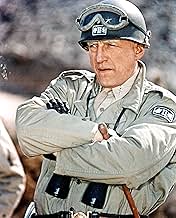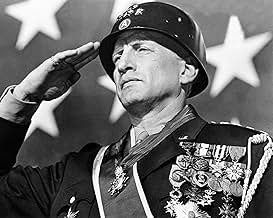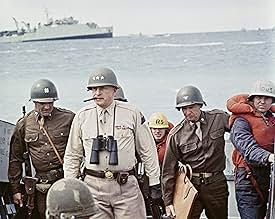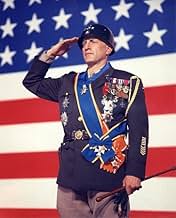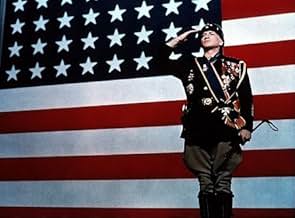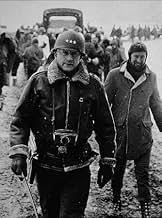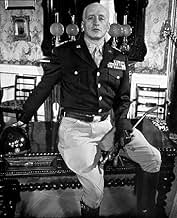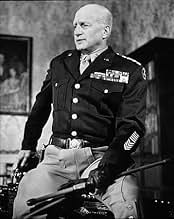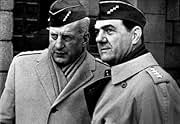Die Zeit des Zweiten Weltkriegs in der Karriere des umstrittenen amerikanischen Generals George S. Patton.Die Zeit des Zweiten Weltkriegs in der Karriere des umstrittenen amerikanischen Generals George S. Patton.Die Zeit des Zweiten Weltkriegs in der Karriere des umstrittenen amerikanischen Generals George S. Patton.
- 7 Oscars gewonnen
- 25 Gewinne & 8 Nominierungen insgesamt
Carey Loftin
- General Bradley's Driver
- (as Cary Loftin)
Pat Zurica
- First Lieutenant Alexander Stiller
- (as Patrick J. Zurica)
Richard Münch
- Colonel General Alfred Jodl
- (as Richard Muench)
Zusammenfassung
Reviewers say 'Patton' is acclaimed for George C. Scott's compelling performance as General George S. Patton, highlighting his complexity. The film is lauded for its epic scope, Franklin J. Schaffner's direction, and powerful war sequences. However, some critics find it lacking in secondary character development and note its lengthy runtime. Historical accuracy is debated, with concerns over anachronisms and creative liberties. Despite these issues, 'Patton' is recognized as a pivotal war film, offering profound insights into leadership and the intricacies of war.
Empfohlene Bewertungen
RELEASED IN 1970 and directed by Franklin J. Schaffner, "Patton" stars George C. Scott as the charismatic general during his WWII campaigns in North Africa and Sicily, as well as France & Germany following the Normandy invasion. After the invasion of Sicily, Patton was reprimanded for slapping a cowardly soldier suffering battle fatigue (in real life it was two soldiers on separate occasions in the course of eight days in August, 1943). The fiery general was removed from command for eleven months while his junior in age and rank, Omar Bradley (Karl Malden), was selected to command the First United States Army for the invasion of Normandy.
Meanwhile, Patton was assigned to London as a decoy to deceive the Germans in a sham operation called Fortitude. The ruse was successful because the German High Command respected Patton more than any other Allied commander and deemed him crucial to any plan to invade mainland Europe. Immediately following the successful invasion, he was put in command of the Third Army in the final Allied thrust against Germany where the headstrong general, once again, proved his mettle as his forces favored speed and aggressive offensive action.
Patton was an interesting character who maintained a flashy larger-than-life image in order to encourage his troops; and he didn't hesitate to get his hands dirty with them. While other officers tried to blend-in with the troops on the battlefield, Patton brazenly displayed his rank insignia. He was a romantic who valued bravery and tenacity above all. All this is effectively conveyed in this ambitious war flick. It's interesting to observe the North African and European theaters of the war from the standpoint of the Allied generals, mostly Patton and Bradley, rather than the typical perspective of the infantry.
THE FILM WAS WRITTEN by Francis Ford Coppola with additional material from Edmund H. North (based on the factual accounts of Ladislas Farago & Omar N. Bradley). It runs 172 minutes and was shot in Spain, Algeria, Morocco, Crete and England, with the opening speech filmed at Bob Hope Patriotic Hall in Los Angeles.
GRADE: A-
Meanwhile, Patton was assigned to London as a decoy to deceive the Germans in a sham operation called Fortitude. The ruse was successful because the German High Command respected Patton more than any other Allied commander and deemed him crucial to any plan to invade mainland Europe. Immediately following the successful invasion, he was put in command of the Third Army in the final Allied thrust against Germany where the headstrong general, once again, proved his mettle as his forces favored speed and aggressive offensive action.
Patton was an interesting character who maintained a flashy larger-than-life image in order to encourage his troops; and he didn't hesitate to get his hands dirty with them. While other officers tried to blend-in with the troops on the battlefield, Patton brazenly displayed his rank insignia. He was a romantic who valued bravery and tenacity above all. All this is effectively conveyed in this ambitious war flick. It's interesting to observe the North African and European theaters of the war from the standpoint of the Allied generals, mostly Patton and Bradley, rather than the typical perspective of the infantry.
THE FILM WAS WRITTEN by Francis Ford Coppola with additional material from Edmund H. North (based on the factual accounts of Ladislas Farago & Omar N. Bradley). It runs 172 minutes and was shot in Spain, Algeria, Morocco, Crete and England, with the opening speech filmed at Bob Hope Patriotic Hall in Los Angeles.
GRADE: A-
10nabor7
Not much can be said of this movie that already hasn't been said. It captures the war, the man, and the conflict of the two. I thought the movie was very nicely tied together and I thought the reflections of Patton on the past was very necessary. Patton believed in reincarnation so in looking back at historical battles you can see how Patton developed his strategy. He was a student of great leaders and commanders and the movie developed that thought really well. The movie presented the characters, the actual war history, and the Germans extremely well and it is no wonder this movie received the awards it did. After watching this movie over and over again, I'm convinced that no one could have played Patton any better than George C. Scott. You can tell from the movie that he put everything he had into the character. My father-in-law was an officer under Patton in the 3rd. Army and has said over and again how realistic the movie is. I would recommend this movie to anyone looking for an excellent re-telling of WWII history.
Oliver Stone has said this film glorifies war, i disagree, what it does is show a man {Patton} who gloried in war, the war is shown through his perspective,and to Patton war is glorious and he revels in it.The performance of George c scott as Patton is brilliant, it shows a complex and demanding character riddled with contradictions ,who believes he was born to be a leader of men,the supporting cast is very good particularly karl Malden who plays general Bradley a calm experienced soldier with no dreams of glory, the perfect foil to the maverick Patton, the combat scenes are well shot and are never more than is necessary to support the narrative,the film rises above being very good to excellence due to George c Scotts intuitive grasp of the character.
It's a splendidly done movie. Scott's performance is powerful. He does everything but reach out, grab you by the shirt, and shout in your face. Karl Malden is likable and full of common sense, but he is the only person in the movie whom we can grasp as a character -- except for Scott himself. Scott is as good at his job as Patton was, and in fact the quality of his performance is less volatile than Patton's own, with virtually no weak spots.
That's part of the problem. Patton himself. I suppose that like most people he had a "good" side -- loving family, played with his dog, collected stamps and whatnot. But as good and aggressive a general as he was, he wasn't a particularly likable guy. It's easy to demand that everyone in your command have shoes as shiny as yours -- especially when you've got some black PFC doing your shining for you.
The movie is noticeably slanted. Patton's weakness, like Coriolanus's, is ambition. Sometimes it's played for laughs. He carried the stars of a Lieutenant General around with him until word of his promotion comes down, then immediately has them pinned on. But only three times is his meanness illustrated without tongue in cheek. (1) During a conversation with Bradley he reveals that he's disobeyed orders by sending his army on a mission to beat Montgomery in taking Sicily. He calls the attack "a reconnaissance in force". He receives an order to get his troops back where they belong and tells his aide to send the message back because it's garbled. "A simple old soldier," Bradly comments disapprovingly. (2) He orders General Truscott to stage some amphibious landings which will help him take Messina before Montgomery. Truscott complains that they're not prepared to do that without heavy casualties. Patton lies down and threatens to fire Truscott and get someone else to do the job. (3) While visiting a hospital and presenting the wounded with decorations he comes across a soldier whose nerves are shot and who is weeping, and Patton slaps him twice and sends him back to the front.
His mean streak went beyond those incidents. He used to practice his arrogant, threatening scowl in front of the mirror. Whether or not it improved the GI's morale to wear neckties in combat is, at best, arguable. (What would Patton make of the Israeli army?) But the simple historical fact is that the movie pitches even these "mean" incidents at the audience like softballs. He didn't just slap a soldier who was feeling sorry for himself, which is the picture the film presents. He slapped two soldiers on separate occasions, one suffering from combat fatigue (which is no joke) and the other from malaria and other illnesses. Patton also enjoyed an intimate relationship with his niece, a Red Cross donut girl, who accompanied him in England and France, much to his wife's displeasure.
Those slapping incidents cost Patton a bit in the way of professional esteem but it didn't cost any lives. And it didn't cause him any remorse. Even in his "apology," he claims he was trying to "shame a coward." What DID cost lives was Patton's cobbling together a small task force to liberate a POW camp in Germany shortly before the war's end, when such a dangerous move was no longer necessary. "Task Force Baum" was recognized by its leaders for the lost cause it was, a plunge deep into enemy territory without any backup. There were 53 vehicles and 294 men. All the vehicles were destroyed or captured. Twenty-five of the men were killed, 32 wounded, and almost all the rest captured. The purpose of the mission, it was tacitly agreed, was to rescue Patton's son-in-law.
His fitful harshness towards his troops is usually justified in the movie, even if it looks excessive. The soldier-slapping scene is preceded by one in which Patton kneels in the hospital, whispers something to a soldier whose face is covered by bandages, and lovingly places a medal on his chest. Next thing he encounters: Tim Considine, fully dressed, sitting up, and sobbing with self pity. Earlier, when Patton asks a cook why he's not wearing sidearms, the cook laughs genially and replies, "Sidearms? Why, hell, General, I'm a cook!" I missed the part where cooks learn to laugh in the face of orders from a general, but it gives Patton a chance to tear everybody a new one.
Everyone paid for Patton's ambition and vanity, even those not under his command. The gasoline and other supplies he diverted to his own forces during the run through France helped him alright, but they were also needed elsewhere.
The movie's subtitle is "Salute to a Rebel." Very stylish for 1970 audiences, but the material is presented in such a way as to leave us with a lingering admiration for Patton's genius and bullheadedness. What kind of "rebel" was he? He was more of an authoritarian Arschloch than anybody else in his greater vicinity.
What the writers, the director, and George C. Scott have given us, to paraphrase someone else, is not a warts-and-all portrait but the suggestion that there is something heroic about a wart.
I gave the movie high marks because it's as well done as it is -- disregarding its relationship to Patton himself. I didn't mind so much that the wrong tanks were used and that the production could only find two Heinkel 111s in flying condition. The location shooting is great, the cinematography crisp and unimpeachable, the score one of Goldsmith's best, and Scott's performance deserved whatever awards it got.
That's part of the problem. Patton himself. I suppose that like most people he had a "good" side -- loving family, played with his dog, collected stamps and whatnot. But as good and aggressive a general as he was, he wasn't a particularly likable guy. It's easy to demand that everyone in your command have shoes as shiny as yours -- especially when you've got some black PFC doing your shining for you.
The movie is noticeably slanted. Patton's weakness, like Coriolanus's, is ambition. Sometimes it's played for laughs. He carried the stars of a Lieutenant General around with him until word of his promotion comes down, then immediately has them pinned on. But only three times is his meanness illustrated without tongue in cheek. (1) During a conversation with Bradley he reveals that he's disobeyed orders by sending his army on a mission to beat Montgomery in taking Sicily. He calls the attack "a reconnaissance in force". He receives an order to get his troops back where they belong and tells his aide to send the message back because it's garbled. "A simple old soldier," Bradly comments disapprovingly. (2) He orders General Truscott to stage some amphibious landings which will help him take Messina before Montgomery. Truscott complains that they're not prepared to do that without heavy casualties. Patton lies down and threatens to fire Truscott and get someone else to do the job. (3) While visiting a hospital and presenting the wounded with decorations he comes across a soldier whose nerves are shot and who is weeping, and Patton slaps him twice and sends him back to the front.
His mean streak went beyond those incidents. He used to practice his arrogant, threatening scowl in front of the mirror. Whether or not it improved the GI's morale to wear neckties in combat is, at best, arguable. (What would Patton make of the Israeli army?) But the simple historical fact is that the movie pitches even these "mean" incidents at the audience like softballs. He didn't just slap a soldier who was feeling sorry for himself, which is the picture the film presents. He slapped two soldiers on separate occasions, one suffering from combat fatigue (which is no joke) and the other from malaria and other illnesses. Patton also enjoyed an intimate relationship with his niece, a Red Cross donut girl, who accompanied him in England and France, much to his wife's displeasure.
Those slapping incidents cost Patton a bit in the way of professional esteem but it didn't cost any lives. And it didn't cause him any remorse. Even in his "apology," he claims he was trying to "shame a coward." What DID cost lives was Patton's cobbling together a small task force to liberate a POW camp in Germany shortly before the war's end, when such a dangerous move was no longer necessary. "Task Force Baum" was recognized by its leaders for the lost cause it was, a plunge deep into enemy territory without any backup. There were 53 vehicles and 294 men. All the vehicles were destroyed or captured. Twenty-five of the men were killed, 32 wounded, and almost all the rest captured. The purpose of the mission, it was tacitly agreed, was to rescue Patton's son-in-law.
His fitful harshness towards his troops is usually justified in the movie, even if it looks excessive. The soldier-slapping scene is preceded by one in which Patton kneels in the hospital, whispers something to a soldier whose face is covered by bandages, and lovingly places a medal on his chest. Next thing he encounters: Tim Considine, fully dressed, sitting up, and sobbing with self pity. Earlier, when Patton asks a cook why he's not wearing sidearms, the cook laughs genially and replies, "Sidearms? Why, hell, General, I'm a cook!" I missed the part where cooks learn to laugh in the face of orders from a general, but it gives Patton a chance to tear everybody a new one.
Everyone paid for Patton's ambition and vanity, even those not under his command. The gasoline and other supplies he diverted to his own forces during the run through France helped him alright, but they were also needed elsewhere.
The movie's subtitle is "Salute to a Rebel." Very stylish for 1970 audiences, but the material is presented in such a way as to leave us with a lingering admiration for Patton's genius and bullheadedness. What kind of "rebel" was he? He was more of an authoritarian Arschloch than anybody else in his greater vicinity.
What the writers, the director, and George C. Scott have given us, to paraphrase someone else, is not a warts-and-all portrait but the suggestion that there is something heroic about a wart.
I gave the movie high marks because it's as well done as it is -- disregarding its relationship to Patton himself. I didn't mind so much that the wrong tanks were used and that the production could only find two Heinkel 111s in flying condition. The location shooting is great, the cinematography crisp and unimpeachable, the score one of Goldsmith's best, and Scott's performance deserved whatever awards it got.
It really doesn't get any better than this one, for realism, casting, set, costumes, scenery..........and all based on a true story. I can see why Scott won Best Actor and the film won BEST MOVIE. Epic movie in all aspects. Every person should watch this movie...... to see what the troops of England and the USA went through during WWII. My father fought in the Ardens during the Battle of the Bulge and he said the scene when Patton was marching up to get the 101st, with the heavy snow in the trees and the 88's blasting the tops of the trees off, took him right back to the heavy fighting where he was severely wounded. It was that realistic. "Patton" is one of my favorite WWII movies and a possible stopping point if it comes up in my "Recommendations" when surfing. This has a little bit of everything going for it, including great acting (Carl Malden and George C. Scott), historically accurate feel, a good bit of drama, and even some humor. "Patton" is one of the best and most honored war films of all time. (8 Academy Awards, including Best Picture, 1970.)
Oscars Best Picture Winners, Ranked
Oscars Best Picture Winners, Ranked
See the complete list of Oscars Best Picture winners, ranked by IMDb ratings.
Wusstest du schon
- WissenswertesThe movie begins without showing the 20th Century-Fox logo, or any other indication that the film is starting. At military bases across the US theater owners reported that soldiers in the audience would often stand up and snap to attention when they heard the movie's opening line ("Ten-hut!"), assuming it to be a real call to attention.
- PatzerContrary to the way it's portrayed in the film, the controversy over George S. Patton's Knutsford speech was not over his having insulted the Russians (in fact, the Army quickly revised the initial transcript of his remarks to reflect that he had mentioned them). It had to do with his talk of "ruling the world" after the war - members of Congress said he had no business as a general commenting on post-war political affairs, while others objected to the notion of the US, Britain or anyone else "ruling the world."
- Crazy CreditsOne of the very, very few Twentieth Century-Fox films in which that company's logo is not shown at all, beginning or end. The film simply begins with the opening speech, and the opening Fox logo is replaced with an in-credit text-only notice after the speech. However, recent television showings have added the logo (not on DVD prints), and the addition is obviously spliced in from another piece of film.
- Alternative VersionenThe Italian version is approximately 20 minutes shorter and removes all scenes set in the German Military HQ and/or showing German officers: although the credits still include the names of German performers, like Karl Michael Vogler as Marshall Rommel, their characters never appear onscreen in the Italian release.
- VerbindungenEdited into Fireball Forward (1972)
- SoundtracksTo the Colors
(uncredited)
Traditional bugle call used in lieu of the National Anthem. Played at the opening scene.
Top-Auswahl
Melde dich zum Bewerten an und greife auf die Watchlist für personalisierte Empfehlungen zu.
Details
- Erscheinungsdatum
- Herkunftsland
- Offizieller Standort
- Sprachen
- Auch bekannt als
- Patton
- Drehorte
- Cabo de Gata, Almería, Andalucía, Spanien(desert scenes)
- Produktionsfirma
- Weitere beteiligte Unternehmen bei IMDbPro anzeigen
Box Office
- Budget
- 12.000.000 $ (geschätzt)
- Bruttoertrag in den USA und Kanada
- 61.749.765 $
- Weltweiter Bruttoertrag
- 61.749.765 $
- Laufzeit
- 2 Std. 52 Min.(172 min)
- Farbe
- Seitenverhältnis
- 2.20 : 1
Zu dieser Seite beitragen
Bearbeitung vorschlagen oder fehlenden Inhalt hinzufügen



